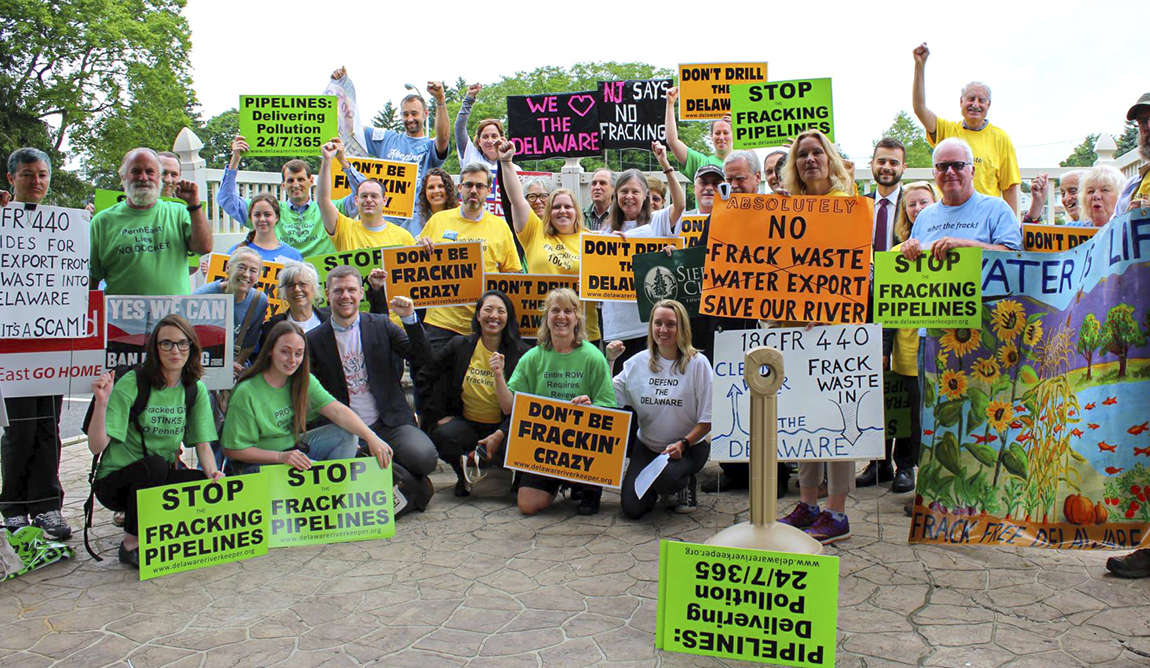In this Issue
- Historic Win! Delaware River Watershed Frack Ban
- Curbing Warehouse Sprawl
- Environmental Justice: No New Polluting Facilities
- Clean Water’s Kim Gaddy Wins Russ Berrie Award
- NJ Green Amendment
- 35th Annual Conference
- World Asthma Day
- Zero Waste in the Garden State!
- Budget for Climate Justice
Historic Win! Delaware River Watershed Frack Ban
After eleven years of debate and public discourse, the Delaware River Basin Commission (DRBC) voted in February 2021 to protect drinking water sources by permanently banning high volume hydraulic fracturing or “fracking” within the basin (including parts of PA, NY, and NJ) throughout the Delaware River Watershed. The Delaware River Frack Ban Coalition and more than 400 members of the public joined the virtual DRBC meeting even though no testimony was being taken. All four states (NY, NJ, PA, DE) voted to approve the ban.
DRBC also took unanimous action and called for regulations to be drafted which could lead to a ban on the import of wastewater produced by fracking for its processing and discharge, as well as the export of water from the basin for use in fracking outside of the watershed. This second resolution is considered absolutely critical by advocates to achieve a complete ban and truly protect the entire Watershed and nearby communities from toxic and radioactive pollution that inextricably comes with fracking (or that is produced by the fracking process). Draft regulations for regulating water import/export must be issued by September 30, 2021. Read more.
Curbing Warehouse Sprawl
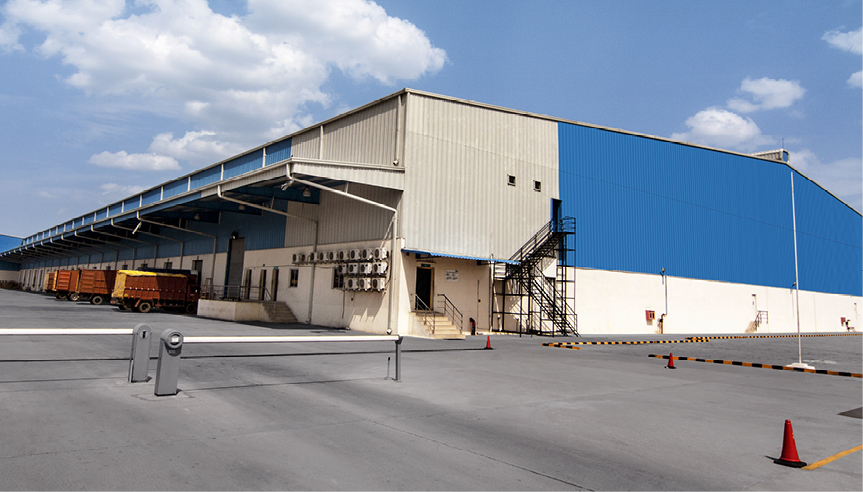
Many local officials would like to see more warehouses built as a vehicle for tax rateables and jobs, but urban, suburban and rural neighborhoods alike are being overwhelmed with warehouse proposals. Unfortunately, warehouses are drastically impacting our quality of life throughout the state, bringing more diesel pollution health harms, and devouring New Jersey’s last remaining open space.
Senators Sweeney (D-3) and Singleton (D-7) have introduced legislation (S3688) that would give a voice to neighboring communities impacted by rampant warehouse development. While Clean Water Action supports this bill, there are many ways it could be made better, including repurposing existing vacant warehouses and structures, creating zero emission zones and corridors, rerouting trucks aways from schools, play areas and residential neighborhoods, allowing only electric trucks and 100% renewable energy to power charging stations to be put into service, and enforcing existing stormwater rules and policies. Read more.
Environmental Justice: No New Polluting Facilities
Since Clean Water Action’s historic victory — passage of New Jersey’s Environmental Justice (EJ) law (S232/A2212) — the New Jersey Department of Environmental Protection (DEP) has been working diligently to draft corresponding regulations. In the meantime, industry is rushing to secure permits for polluting facilities like the Aries sludge-processing plant and Passaic Valley Sewerage Commission (PVSC) fracked gas power plant in Newark, and Georgia-Pacific Gypsum plant in Camden.
These facilities have been proposed in communities that are already overburdened by the cumulative health impacts of existing polluting facilities. These communities are primarily low income communities of color. As a result, permits for the new polluting facilities, renewals, or expansions would be covered by the law once state regulations are adopted later this year.
The new fracked gas power plant proposed by PVSC, a state agency, is touted as a “resiliency” plan for backup power in case of extreme climate-related weather events like Superstorm Sandy. “This fracked gas plant directly contradicts Governor Murphy’s policies to deal with environmental justice and the climate crisis! Newark can’t be the dumping ground for everyone else. We need resilience in the event of another disaster like Superstorm Sandy but the solution can’t be to perpetuate New Jersey’s legacy of environmental racism,” said Kim Gaddy, Newark resident, South Ward Environmental Alliance founder and Clean Water Action’s National and NJ Environmental Justice Director. “My family and neighbors already suffer from toxic pollution from the nearby port, highways, airport, incinerator, many other smoke stacks and contaminated sites. The Governor and NJ Transit stepped up in the Meadowlands, now PVSC and the governor need to follow suit here, stop this disastrous proposal and redesign it with renewables.”
The granting or even processing of permits for these facilities before the final EJ Regulations are adopted violates the intention of the EJ law and could irreversibly harm the public health, safety, and welfare of residents in overburdened communities for generations to come. Clean Water Action and its allies urge Governor Murphy to issue an executive order directing the DEP not to issue permits for facilities in these communities before the regulations become enforceable and can be applied to all pending permit applications. While the Murphy administration has publicly indicated that it will act in the “spirit of the law” even before the rules are formally adopted, a moratorium would ensure that no polluters slip through and that already overburdened communities are protected from further harm. Take action here.
Clean Water’s Kim Gaddy Wins Russ Berrie Award
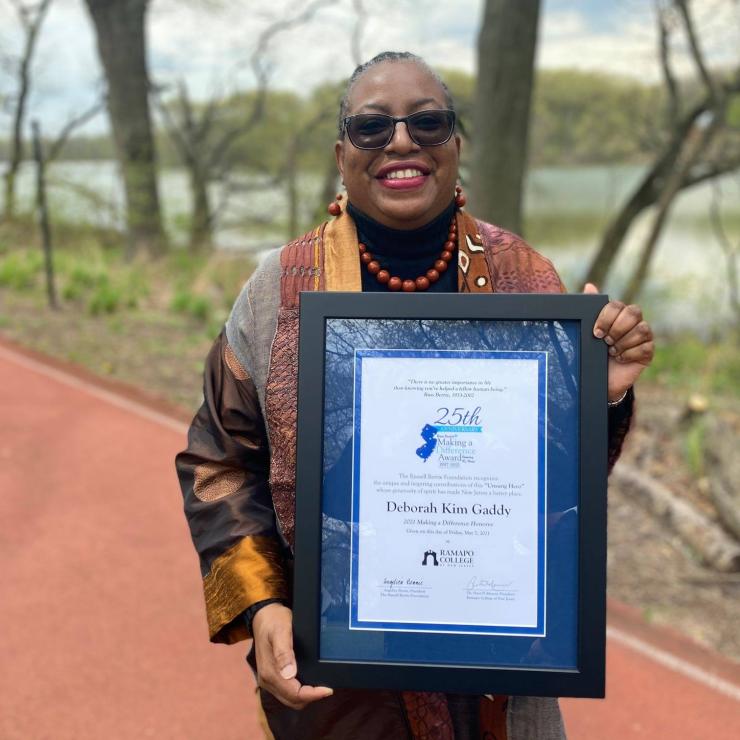
Environmental Justice Director Kim Gaddy was chosen as a 2nd place recipient of the highly competitive for Russ Berrie Making A Difference Award for over 20 years of leadership fighting for environmental justice in New Jersey. View the Award Ceremony here (start at 20:10 minutes).
NJ Green Amendment
New Jersey legislators have proposed a constitutional Green Amendment to recognize and protect the rights of all residents, including future generations, to clean water and air, a stable climate, and healthy environments. The proposed language also ensures preservation of the natural, scenic and historic qualities of the environment, and will impose a constitutional duty on all government officials to proactively protect the people’s environmental rights and the state’s natural resources. Clean Water Action is working to ensure NJ legislators place the amendment on the ballot this November. Learn more here.
35th Annual Conference
Clean Water Action held its 35th Annual Conference, Upholding Democracy and a Healthy Environment, April 17 through May 8. Surprise guest First Lady Tammy Murphy provided opening remarks, followed by a special video greeting from US Senator Booker, and a live zoom conversation with NJ Congresswoman Bonnie Watson-Coleman on race, environment, budget priorities, and strengthening our democracy. After the inspiring keynote, we hosted four issue-based workshops featuring activists and experts on zero waste, stormwater, climate, and the NJ Green Amendment.
To watch or rewatch these virtual programs, you can view and share them here:
- Keynote Conversation with Bonnie Watson Coleman
- Zero Waste & Democracy
- We All Live Downstream
- Punching Above Our Weight: How NJ and Other States are Winning Climate Victories
- A Healthy Environment is a Human Right
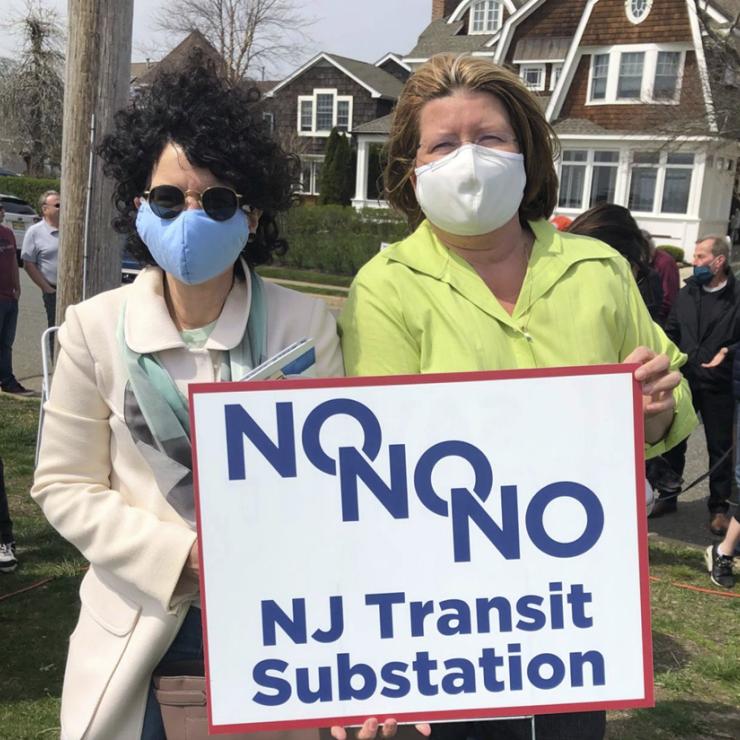
Just Say No: Clean Water Action Board Chair Janet Tauro and Britta Forsberg, Executive Director of Save Barnegat Bay, protesting a polluting diesel substation for NJTransit in Bay Head, NJ.
World Asthma Day
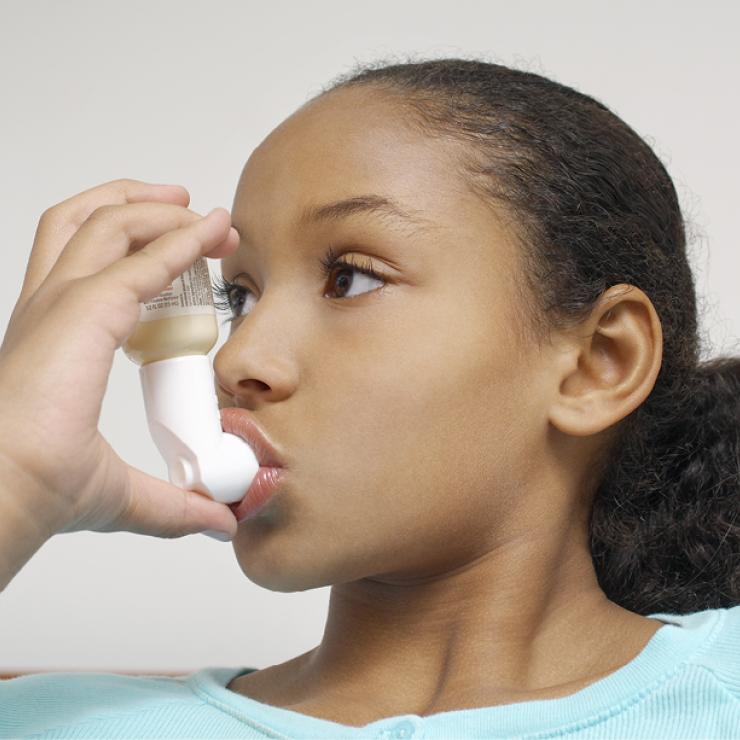
On World Asthma Day, May 4th, Clean Water Action held a virtual forum to raise awareness of asthma, improve the lives of all people living with this chronic disease, and reduce asthma disparities.
In the U.S., 25 million (7.7%) people have asthma. Asthma rates are twice as high (14%) in black and brown communities. These same communities have been heavily impacted by Covid-19 because of a number of pre-existing health and environmental conditions including respiratory ailments caused by chronic exposure to multiple sources of air pollution and lack of access to quality health care.
Some of the solutions discussed address the root causes of asthma and include investments in clean new public transit for communities with heavy traffic and vehicle exhaust, and environmental justice reforms like New Jersey’s recent cumulative impacts law mentioned earlier. Speakers also discussed the impact of climate change on asthma, including longer allergy seasons, hotter temperatures and how our efforts to fight climate change should prioritize communities that are on the frontlines and most impacted.
The virtual town hall was co-hosted by Clean Water Action and allies at Athena, an alliance of people and organizations who believe that everyone should be able to enjoy the benefits of digital technologies and online commerce without having to sacrifice our rights and liberties, health and planet, or hopes and dreams. In case you missed it, you can watch the virtual event here!
Zero Waste in the Garden State!
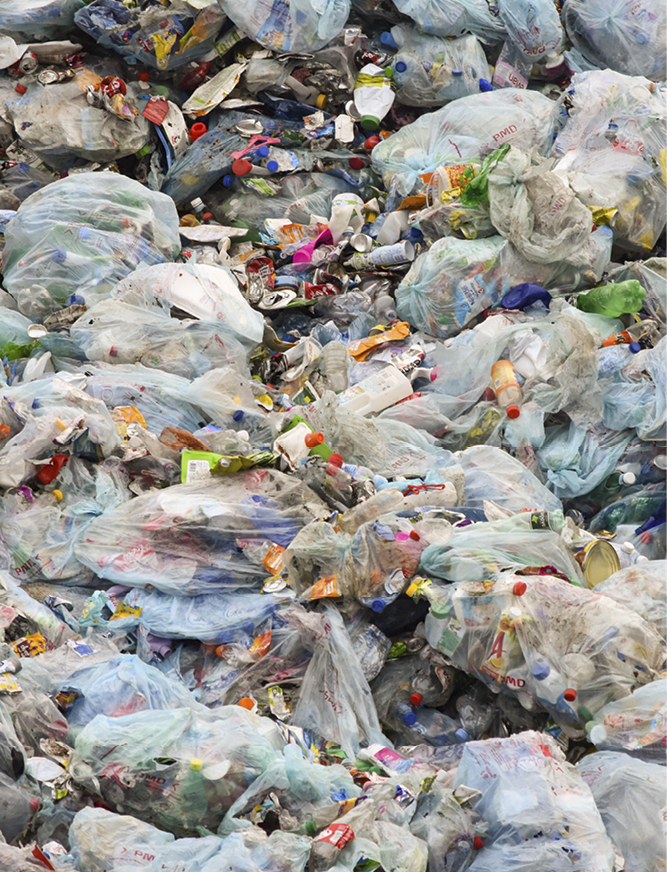
Clean Water Action’s ReThink Disposable program is preparing for implementation of New Jersey’s ban on single-use plastic bags and foam containers — the strongest single-use plastics law in the nation! The ban doesn’t go into effect until May 2022, but the state is already urging businesses to prepare for the change and campaigning for consumers to remember their reusable bags.
Right on its heels is a new bill (S2515) that would require manufacturers of rigid plastic containers, beverage containers, glass, and paper products to increase the percentage of post-consumer recycled content in their products. While we cannot recycle our way out of the global plastic pollution crisis, this bill is an important step to stopping the production of virgin single-use plastics and keeping more plastics out of polluting incinerators and landfills.
The DEP is also currently developing the rules for the new food waste recycling law (A237/S865) encouraging large-scale composting facilities, which will go into effect in October The DEP is also revising regulations to make it possible for smaller community-scale composting sites to be established, making it easier for community compost sites to serve local residents and divert the largest source — household food scraps — currently sent to incinerators and landfills as trash. This will be another important milestone in establishing zero waste systems in New Jersey.
Budget for Climate Justice
Governor Murphy released his draft Fiscal Year 2022 budget and it includes proposed raids to the Clean Energy Fund and underfunds NJ Transit. New Jersey borrowed billions of dollars at the beginning of the pandemic when our finances appeared dire; but now the state is sitting on a massive unexpected surplus. Science says we have less than a decade left to avert the worst impacts of the climate crisis. Clean Water Action believes New Jersey should use this money to invest in long-term, job-creating projects that bring us into a clean energy future and away from fossil fuels. Take action here.
